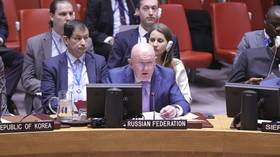US profits from climate change loans to poor countries – media

A program that ostensibly helps developing nations deal with the effects of climate change has reportedly generated windfall profits for Japan, the US, and other wealthy countries, Reuters reported on Wednesday.
The gains stem from a pledge to provide $100 billion a year to help poor nations cope with climate change and undertake projects to reduce their greenhouse gas emissions, according to the report, which cites an analysis of UN and Organization for Economic Cooperation and Development (OECD) data. Benefactor countries have channeled money from the program back into their own economies, reaping billions of dollars in profits, it says.
Japan, the US, France, Germany, and other wealthy nations have made the initiative a money-making opportunity by extending loans at market rates – rather than giving grants or low-interest financing – or insisting that the recipients hire their companies to carry out the projects. Reuters said it identified nearly $22 billion in loans and grants that came with such strings attached.
“Offering climate loans at market rates or conditioning funding on hiring certain companies means that money meant for developing countries gets sent back to wealthy ones,” Reuters said. Liane Schalatek, associate director with Germany’s Heinrich-Boll Foundation policy think tank, called the tactics “deeply reprehensible.” She added, “Climate finance provision should not be a business opportunity.”
The funding pledges were first made in 2009, supposedly to help poor countries that were disproportionately harmed by climate change. Roughly $353 billion was paid from 2015 through 2020. Reuters said more than half of that money came in the form of loans, which indebted poorer nations used “to solve problems largely caused by the developed world.”
Andres Mogro, Ecuador’s former director of climate initiatives, said the program heaped a new wave of debt on the global south. “It’s like setting a building on fire and then selling the fire extinguishers outside.”
Ritu Bharadwaj, a researcher at the UK-based International Institute for Environment and Development, told Reuters that the benefits reaped by developed nations have overshadowed the program’s primary objective of supporting climate action in poorer countries. “This is a classic example where a bad loan, which has been given to a country in the garb of climate finance, will create further financial stress.”
UN data showed that more than half of the 54 most indebted developing nations also ranked among the most vulnerable countries to climate change. Reuters showed that ten debt-distressed nations – led by Egypt, Kenya, Sri Lanka and Tunisia – took on a combined $11.5 billion in climate loans.
“Heavily indebted countries face a vicious cycle: Debt payments limit their ability to invest in climate solutions, while extreme weather causes severe economic losses, often leading them to borrow more,” Reuters said.













